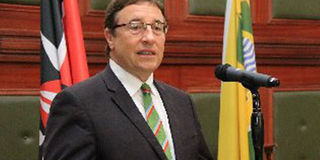Breaking News: KDF chopper crash kills five in West Pokot
Women, children most affected by environmental pollution, Unep report says

UNEP Executive Director Achim Steiner. A Unep report has said that almost a quarter of all the deaths in the world could have been prevented if people took better care of their environment, a new report has revealed. PHOTO | JEFF ANGOTE | NATION MEDIA GROUP
What you need to know:
- In 2012, says the United Nations report, an estimated 12.6 million death were as a result of air pollution, exposure to dangerous chemicals, drinking unsafe water and other ways the environment gets degraded by human activities.
- Women and children, who arguably spend the most time indoors, are the most affected by household air pollution from the use of organic fuels for cooking and lighting.
- This year’s UNEA session is taking place under the theme of “Delivering on the environmental dimension of the 2030 agenda for Sustainable Development.”
Almost a quarter of all the deaths in the world could have been prevented if people took better care of their environment, a new report has revealed.
In 2012, says the United Nations report, an estimated 12.6 million death were as a result of air pollution, exposure to dangerous chemicals, drinking unsafe water and other ways the environment gets degraded by human activities.
At least one in every four deaths of children aged five years and below can be traced back to environmental impacts.
Speaking after launching the report, United Nations Environment Program Executive Director Achim Steiner said: “If you know that something in the environment is killing other people, then you are held responsible.”
He added: “By depleting the ecological infrastructure of our planet and increasing our pollution footprint, we incur an ever-growing cost in terms of human health and well-being.”
The staggering statistics showing the link between the state of the environment and the health of its human inhabitants over the years can no longer be ignored, said Mr Steiner.
For instance, air pollution now kills more than seven million people across the world every year, and 4.3 million of these are due to indoor pollution.
Women and children, who arguably spend the most time indoors, are the most affected by household air pollution from the use of organic fuels for cooking and lighting.
Manufactured chemical pollution is also on the rise, with some 107,000 dying annually from exposure to asbestos, according to the report dubbed: Healthy Environment, Healthy People.
LEAD POISONING
In 2010, approximately 654,000 people died from lead poisoning, which usually results from contact with paint and batteries.
Jacqueline McGlade, the chief scientist at UNEP, said exposure to toxins is inevitable and the sooner the problem is dealt with, the better.
“There is nowhere in the world where you will not be exposed to some form of toxin. The nexus between people's health and the environment can no longer be ignored,” she said.
Ms McGlade challenged Environment Ministers across the world to push policies that will protect the health of citizens, adding: “this will end up being cost effective compared to the cost of treating sick people.”
Earlier in the day, Environment Cabinet Secretary Judi Wakhungu addressed the hundreds of key environment decision makers, government representatives, intergovernmental organisations and members of civil society attending the second United Nations Environment Assembly (UNEA-2) at the UN offices in Gigiri.
Ms Wakhungu said: “For the last 50 years, Kenya has been at the forefront for advocating a multilateral system for solving global problems.”
She added: “Let us address the nexus between environmental health and human health in light of the 2030 agenda. Healthy ecosystems are a global priority.”
This year’s UNEA session is taking place under the theme of “Delivering on the environmental dimension of the 2030 agenda for Sustainable Development.”
More than 20 draft resolutions on environmental conservation, including a landmark agreement on the fight against illegal trade in wildlife, will be finalised in the next three days.





